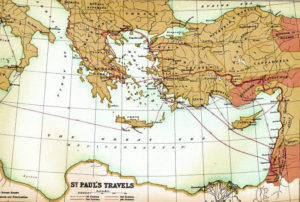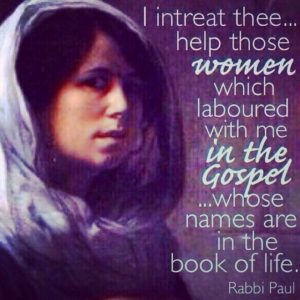In the first century, women were a vital part of the preaching of the Good News and the establishment of Messianic congregations. They served in all spiritual roles as mentors, leaders, teachers, exhorters, prophetesses, administrators, deaconess, etc.; nowhere in the New Testament is this more obvious than in the church of Philippi.
In order to understand how the congregation in Philippi was established, we need to turn to the book of Acts for the history. The Apostle Paul and Silas were on an evangelistic outreach, with plans to head to Asia, but the Holy Spirit had another assignment.
And they went through the region of Phrygia and Galatia, having been forbidden by the Holy Spirit to speak the word in Asia. And when they had come up to Mysia, they attempted to go into Bithynia, but the Spirit of Jesus did not allow them. So, passing by Mysia, they went down to Troas. And a vision appeared to Paul in the night: a man of Macedonia was standing there, urging him and saying, “Come over to Macedonia and help us.” And when Paul had seen the vision, immediately we sought to go on into Macedonia, concluding that God had called us to preach the gospel to them. (Acts 16:6-10 ESV)
Isn’t it odd that the Apostle Paul was determined to preach the Gospel in Asia and was deterred from that plan by the Holy Spirit? What was the Ruach doing in not allowing the Good News to go forth in Asia through the preaching of Paul and Silas? What was so important as to divert these men on their mission from God? Why did Paul receive a vision of a man from Macedonia/Greece?
The Spirit was leading these men and they were having a bit of difficulty discerning which direction to travel. They had a plan, but Adonai ordered their steps. There was urgency in the vision at Troas that compelled the men to move immediately to Macedonia. When they arrived, where was the man in the vision?

So putting out to sea from Troas, we ran a straight course to Samothrace, and on the day following to Neapolis; and from there to Philippi, which is a leading city of the district of Macedonia, a Roman colony; and we were staying in this city for some days. And on the Sabbath day we went outside the gate to a riverside, where we were supposing that there would be a place of prayer; and we sat down and began speaking to the women who had assembled. (Acts 16:11-13 NASB)
Was it a surprise to the apostles that the call from a man from Macedonia was to Sabbath-honoring women gathered for prayer? There is no mention of faithful men gathered at the riverside. Were there no men to meet within a synagogue in Philippi?
The change of direction from Asia introduced the Gospel for the first time to Europe, to a group of women, and Lydia of Philippi was the first European convert to Messiah.
A woman named Lydia, from the city of Thyatira, a seller of purple fabrics, a worshiper of God, was listening; and the Lord opened her heart to respond to the things spoken by Paul. And when she and her household had been baptized, she urged us, saying, “If you have judged me to be faithful to the Lord, come into my house and stay.” And she prevailed upon us. (Acts 16:14-18 NASB)
In Carolyn Custis James’ book, Lost Women of the Bible, states this about the reason for the Macedonian vision to Paul.
…Paul found a group of women praying outside the city gate, along the riverbank. If Paul was disappointed, the text does not say. But clearly, God intended to establish a beachhead for the gospel in Enemy territory on European soil with a band of women. (pg. 210)
Lydia’s faith in Christ immediately led to action as she opened her home to shelter and care for the apostles…She insisted they stay with her. The ezer-warrior emerges almost immediately in Lydia. Despite the threat of danger to herself, she never retracted the offer. By the time hostilities forced the apostles out of Philippi, Lydia’s home appears to be the established meeting place for the Philippian church (Act. 16:40). (Lost Women of the Bible, pg. 211)
Carolyn James believes that the women gathered at the river bank were probably “God-fearers” and that there was not a synagogue in Philippi for them to be a part of. Jewish tradition requires that ten men be present for prayer to establish a synagogue. During his travels, Paul usually visited a synagogue on the Sabbath day and it appears from the book of Acts that there was not a synagogue to meet in the city of Philippi. Carolyn continues with these impactful statements.
There may not have been enough Jewish men in Philippi to form an official synagogue, but Paul established one of the leading New Testament churches with a group of women. This groundbreaking development for the gospel was decidedly female. A woman was the first convert to Christianity in Europe, and the first church plant in Europe was predominately female. Paul had crossed the cultural divide, but in doing so he was only following the lead of Jesus. (Lost Women of the Bible, pg. 212)
…Was Paul disappointed when the Holy Spirit led him to a group of praying women? Did he fear the feminization of the church in Philippi? Was he looking for a few good men to take over this new ministry that was overloaded with women? Had the Holy Spirit made some terrible mistake?
Some years later…Paul gave his answer in a letter…to his friends in Philippi. “I thank my God every time I remember you. In all my prayers for all of you, I always pray with joy because of your partnership in the gospel from the first day until now.” (Phil. 1:3-5) (The Lost Women of the Bible, pg. 213)
…Evidently, looking back, Paul could see that the Holy Spirit redirected him to Philippi in part because the women there needed to hear the gospel and partly because he needed the ministries these women had to offer him. It appears the so-called “prophet of female inferiority” had a high regard for women after all and valued them as an invaluable gift from God because of their “partnership in the gospel from the very first day.” (The Lost Women of the Bible, pg. 213)
The partnership in the gospel from the very first day was with Lydia, a female co-laborer in the Kingdom of God. The Apostle Paul valued his first convert in Europe and gave her the recognition as the leader of the church of Philippi which met in the home of Lydia. Take note, Lydia does not have a male covering. There is no mention of her husband, father, cousin, uncle, or brother in this passage. She is a full-fledged leader in her own right.
In the book, Women Restored, Dr. Jimmilea Berryhill quotes Karen Torjensen about the congregation in Philippi.
The church in Philippi was not only founded by a woman, but its leadership continued in the hands of women. In Paul’s letters to the Philippian church, he addressed three women leaders. He exhorted Euodia and Syntyche to reconcile their differences in order to provide more effective leadership for the church. For the third woman, he used the affectionate term ‘syzuge’ which means ‘mate’ or ‘partner’ he encouraged her to support Euodia and Syntyche, his co-workers, women who “labored with me in the gospel” (Phil.4:1-13) (Women Restored, pgs. 90-91)

In the chapter, “Recovering the Blessed Alliance – Paul and the Women of Philippi,” Carolyn Custis James writes this powerful message:
While Paul intended to correct and restore, he also meant to honor his two friends. His concern reflects their significance to him and their profound influence on the whole church. In urging them to set aside their dispute for the sake of unity, he speaks of them with utmost respect as “women who have contended [or labored] at my side in the cause of the gospel” (Phil. 4:3) – words that carry a metaphorical reference to gladiators fighting side by side in the arena…Far from demeaning women, Paul is actually declaring them essential for ministry. As the commanding general, Paul is admonishing two of his frontline soldiers to work together to advance the gospel. (Lost Women of the Bible, pg. 216)
Once again, it is the time to realign with the intent of the Good News and see the female image bearers rise up alongside their brothers in Messiah and fight the good fight of faith together.
References:
Lost Women of the Bible – The Women We Thought We Knew © 2005 Carolyn Custis James, published by Zondervan
Women Restored © 1999 Jimmilea Berryhill, published by Essence Publishing

0 Comments